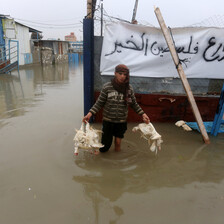The Electronic Intifada 7 November 2017

A Palestinian farmer collects potatoes during the harvest in Beit Lahiya, northern Gaza, November 2016.
APA imagesSamih Abu Qaida is worried that he will have to give up his job.
The 45-year-old has been farming since his early teens and has never encountered difficulties so severe as those of recent months. Power shortages in Gaza mean he cannot work the pumps needed to irrigate crops.
“Our job cannot be done without electricity,” he said.
Alternative fuel for his machinery is “scarce and unaffordable,” Abu Qaida, who lives in the southern Gaza town of Khan Younis, added. The extra costs involved have reduced his income and made it increasingly difficult to provide for his 11-strong family.
This year’s harvest was very poor for another Gaza farmer, Raed Abu Kameel.
The few tomatoes he was able to sell were of low quality, with the result that he could only charge a small price when they went to market. He was unable to water his crops during hot weather.
Abu Kameel is 56 and had hoped that his children would also become farmers. Yet only one of his six sons has done so.
“Because of these conditions, agriculture is now unattractive to the younger generations,” he said. “This is tragic. We have the right soil and temperature here to grow fruit and vegetables. But the political conditions have a terrible effect on every aspect of our lives.”
Food production plummets
Thousands of families in Gaza rely on agriculture to make ends meet. Challenging under any circumstances, food production has plummeted in Gaza since the current power crisis began during April.
The United Nations monitoring agency OCHA has reported that many farmers have ceased irrigating completely and abandoned cropped land in order to graze cattle.
OCHA stated in September that 30,000 out of 80,000 dunams planted with seasonal vegetable crops were at serious risk because they had not been properly irrigated (a dunam is 1,000 square meters).
Majid Abu Rish, another farmer in Khan Younis, is among those who has tried to change his activities.
He used to plant onions, tomatoes and potatoes. This year, he has switched to rearing cattle. The money he has made “can barely cover my costs,” he said.
Gaza has suffered a number of power crises since Israel placed the territory under siege more than a decade ago. This year, Gaza’s problems have been exacerbated by tensions between rival parties Fatah and Hamas.
The Palestinian Authority, which is dominated by Fatah, ceased paying Israel to supply Gaza with energy in April.
Israel responded with a 40 percent cut to the amount of electricity it provided Gaza. As a result, Gaza’s inhabitants often had to make do with just two hours of power per day.
Disrupted
Although Hamas and Fatah have clinched a reconciliation deal recently, the electricity supply remains disrupted.
Gaza’s only power plant now runs on fuel imported from Egypt. The plant has suffered a series of problems since being bombed by Israel in 2006.
After receiving some Egyptian fuel in September, Palestinians in Gaza have suffered further power shortages due to violence in the neighboring Sinai peninsula. In the past few weeks, electricity has only been provided for periods of four consecutive hours – followed by outages lasting 12 hours.
Nizar al-Wahidi, a senior agriculture ministry official in Gaza, said that buying fuel to operate machinery has meant that farmers’ costs have risen fourfold since the power crisis began. “This has sharply decreased the profits of our farmers,” he said. “And the quality of the produce has deteriorated.”
To make matters worse, Israel frequently attacks farmland in Gaza.
On 24 October, for example, the Israeli military drove four bulldozers into Gaza, razing the invaded land.
Israeli troops also regularly open fire on farmers and shepherds working near the boundary between Gaza and Israel.
Following its major bombardments of Gaza in recent years, Israel has offered assurances that it would allow farmers greater freedom to work without coming under fire.
As part of such assurances, farming is theoretically allowed in all areas more than 100 meters from the boundary between Gaza and Israel.
The Israeli military, however, has continued attacking farmers, fishermen and other civilians.
Seven people were injured on land in Gaza during September after being fired on by Israeli troops.
Isra Saleh el-Namey is a journalist from Gaza.





